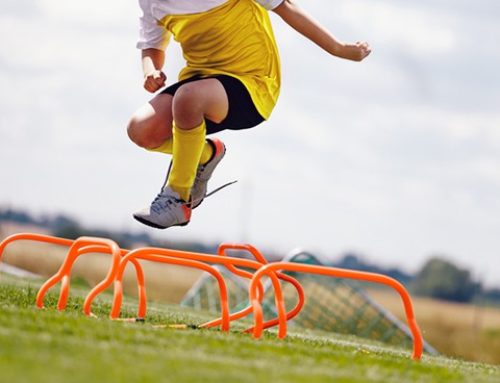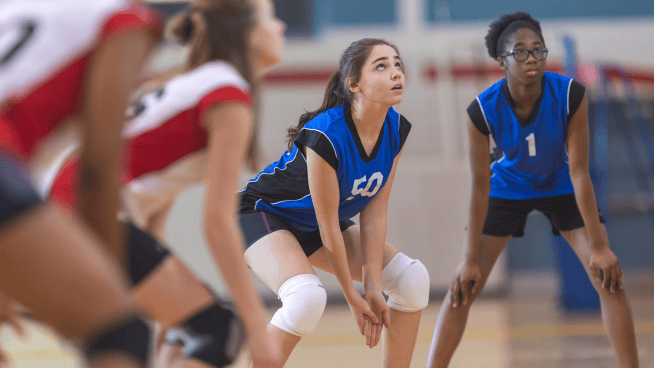Why Reducing Stress Might Speed Up Concussion Recovery
Most concussions heal fairly quickly. Eighty percent of concussions are fully recovered from within a month. This is a testament to the brain’s incredible ability to repair damage.
Concussions heal from rest—by limiting physical activity and exposure to overly stimulating or stressful environments. Athletes with concussions should stop playing their sport, stay out of school and try to relax until their symptoms are gone.
There might be a way to expedite this process by improving heart rate variability (HRV). Here is an explanation of HRV from my previous article, The Heart Rate Measure That Tells You More About Your Body Than Anything Else Will:
At its most basic level, the heart is a pump, and the central nervous system (CNS) is its power supply. The CNS sends electrical impulses that causes heart muscles to contract, pumping blood throughout the body. An electrocardiogram (ECG or EKG) can detect this impulse. The QRS complex shown below indicates a heartbeat. HRV measures the interval between R waves, in milliseconds. This number changes as you inhale and exhale, and it depends on the amount of stress you’re under.
Less stress and fatigue leads to a more variable heart rate, because the parasympathetic nervous system, which slows down your heart rate, is more active. On the other hand, the sympathetic nervous system, which is responsible for the fight-or-flight response, takes over under stressful situations and boosts your heart rate.
Each person has his or her own individual HRV range on a scale from 0 to 100. Higher is better. If your HRV falls below your average range, that indicates your body is under stress. If it’s greater than your average range, your body is ready to take on a tough challenge.
Since the brain is the control center of the central nervous system, there’s a direct connection between the brain and the heart. So researchers decided to investigate how an injured brain might affect heart function.
A 2007 study found that during a concussion, the sympathetic response increases while the parasympathetic nervous system is suppressed due to changes that occur within the damaged brain. Sure enough, a 2012 study confirmed that individuals who suffered a concussion had impaired HRV.
In essence, a concussion stresses the brain and manifests itself in a lower HRV.
RELATED: How to Keep Your Kids Safe From Concussions
So what if we reverse the process and try to improve HRV? When your brain is injured, you want to limit stress as much as possible—the exact goal of HRV training, or what’s also called HRV biofeedback.
Initial tests of this technique have been promising. Researchers found that after 10 weeks of HRV training, a patient with post-concussion symptoms showed improved mood, fewer concussion symptoms, reduced headaches and higher HRV.
More research needs to be done on this topic. But working to improve HRV when recovering from a concussion makes sense based on the brain and heart connection. Even if later research concludes that improving HRV does not speed up concussion recovery, there’s nothing wrong with trying to reduce stress during a time that’s inherently stressful for athletes.
To improve your HRV, there are a few simple things you can do to reduce the amount of stress in your body. If you suffer a concussion, you will engage in minimal physical activity, so these tips account for that adjustment.
Get Better Sleep
Sleep is a critical aspect of recovery. Athletes should get at least eight hours of sleep every night. Some elite athletes sleep for 10 hours. Remember to stay off your phone an hour before you go to bed to eliminate distractions.
Improve Your Breathing
If you breathe through your chest, you’re breathing incorrectly. You should breathe through your diaphragm, or your belly. Deep abdominal breaths fill your lungs more completely from the bottom up, sending more oxygen into your bloodstream. It also lowers your heart rate and decreases tension in your body. Ideally, you should take between 5 and 7 full breaths per minute.
Reduce Emotional Stress
Emotional stress can come from a number of sources, all of which have an effect on HRV. To help control stress, try guided meditation. It can help take your mind off things that may be adding stress to your life.
Eat Anti-Inflammatory Foods

Inflammation is a sign that your body is stressed. Eating foods such as sugar, trans fat, dairy and processed meats promotes inflammation. Instead, eat anti-inflammatory foods like fatty fish, whole grains, nuts and extra virgin olive oil.
Source: Heart rate variability interventions for concussion and rehabilitation
RECOMMENDED FOR YOU
MOST POPULAR
Why Reducing Stress Might Speed Up Concussion Recovery
Most concussions heal fairly quickly. Eighty percent of concussions are fully recovered from within a month. This is a testament to the brain’s incredible ability to repair damage.
Concussions heal from rest—by limiting physical activity and exposure to overly stimulating or stressful environments. Athletes with concussions should stop playing their sport, stay out of school and try to relax until their symptoms are gone.
There might be a way to expedite this process by improving heart rate variability (HRV). Here is an explanation of HRV from my previous article, The Heart Rate Measure That Tells You More About Your Body Than Anything Else Will:
At its most basic level, the heart is a pump, and the central nervous system (CNS) is its power supply. The CNS sends electrical impulses that causes heart muscles to contract, pumping blood throughout the body. An electrocardiogram (ECG or EKG) can detect this impulse. The QRS complex shown below indicates a heartbeat. HRV measures the interval between R waves, in milliseconds. This number changes as you inhale and exhale, and it depends on the amount of stress you’re under.
Less stress and fatigue leads to a more variable heart rate, because the parasympathetic nervous system, which slows down your heart rate, is more active. On the other hand, the sympathetic nervous system, which is responsible for the fight-or-flight response, takes over under stressful situations and boosts your heart rate.
Each person has his or her own individual HRV range on a scale from 0 to 100. Higher is better. If your HRV falls below your average range, that indicates your body is under stress. If it’s greater than your average range, your body is ready to take on a tough challenge.
Since the brain is the control center of the central nervous system, there’s a direct connection between the brain and the heart. So researchers decided to investigate how an injured brain might affect heart function.
A 2007 study found that during a concussion, the sympathetic response increases while the parasympathetic nervous system is suppressed due to changes that occur within the damaged brain. Sure enough, a 2012 study confirmed that individuals who suffered a concussion had impaired HRV.
In essence, a concussion stresses the brain and manifests itself in a lower HRV.
RELATED: How to Keep Your Kids Safe From Concussions
So what if we reverse the process and try to improve HRV? When your brain is injured, you want to limit stress as much as possible—the exact goal of HRV training, or what’s also called HRV biofeedback.
Initial tests of this technique have been promising. Researchers found that after 10 weeks of HRV training, a patient with post-concussion symptoms showed improved mood, fewer concussion symptoms, reduced headaches and higher HRV.
More research needs to be done on this topic. But working to improve HRV when recovering from a concussion makes sense based on the brain and heart connection. Even if later research concludes that improving HRV does not speed up concussion recovery, there’s nothing wrong with trying to reduce stress during a time that’s inherently stressful for athletes.
To improve your HRV, there are a few simple things you can do to reduce the amount of stress in your body. If you suffer a concussion, you will engage in minimal physical activity, so these tips account for that adjustment.
Get Better Sleep
Sleep is a critical aspect of recovery. Athletes should get at least eight hours of sleep every night. Some elite athletes sleep for 10 hours. Remember to stay off your phone an hour before you go to bed to eliminate distractions.
Improve Your Breathing
If you breathe through your chest, you’re breathing incorrectly. You should breathe through your diaphragm, or your belly. Deep abdominal breaths fill your lungs more completely from the bottom up, sending more oxygen into your bloodstream. It also lowers your heart rate and decreases tension in your body. Ideally, you should take between 5 and 7 full breaths per minute.
Reduce Emotional Stress
Emotional stress can come from a number of sources, all of which have an effect on HRV. To help control stress, try guided meditation. It can help take your mind off things that may be adding stress to your life.
Eat Anti-Inflammatory Foods

Inflammation is a sign that your body is stressed. Eating foods such as sugar, trans fat, dairy and processed meats promotes inflammation. Instead, eat anti-inflammatory foods like fatty fish, whole grains, nuts and extra virgin olive oil.
Source: Heart rate variability interventions for concussion and rehabilitation













